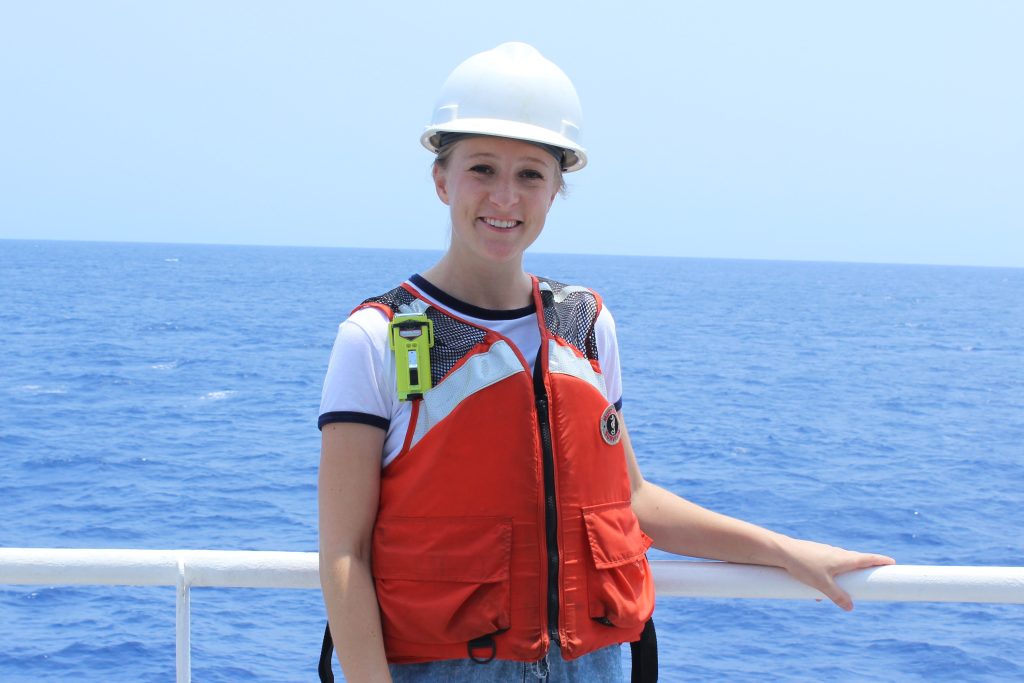Dr. Kirsty McQuaid, South Africa
Recipient of the third Edition of the
ISA Secretary-General Award for Excellence in Deep-sea Research

Please tell us a little bit about yourself
My name is Kirsty McQuaid and I am a deep-sea benthic ecologist from South Africa. I grew up in a small town on the south coast, where I studied marine biology, followed by a Masters at the University of Cape Town. After this I did an internship at the South African National Biodiversity Institute, where I had incredible mentorship and opportunities. At SANBI I fell in love both with the intrigue and mystery of offshore research and the potential for impact when working at the science-policy interface.
I realized I wanted to pursue a PhD in deep-sea research, but, due to limited academic capacity, equipment and infrastructure, this would have been very difficult in South Africa. I was fortunate to be awarded a PhD fellowship at the University of Plymouth, England, through the ISA’s training program for building capacity in developing states, and so moved my life to England to study for 4 years.
I now work as a joint postdoctoral researcher between the University of Plymouth and the South African National Biodiversity Institute, on a project focused on transdisciplinary research for transformative ocean governance. I am passionate about deep-sea science that informs policy and decision-making, and particularly about helping to develop capacity in deep-sea research in my home – South Africa.
Why did you choose to become a marine scientist? Did you have a role model that influenced your decision?
I got into marine, and even deep-sea, science because of my father. He is a marine biologist, and when we were little he would take me and my siblings down to the shoreline to look in the rock pools and take us with him on field trips and sampling. When we had lectures on marine biology at university, again, it was my father who lectured us on the wonders of the deep sea. He is an incredible teacher who draws you in and captures your attention, and this was the starting point for my journey. But there are many other people who have ignited this interest, mostly importantly female mentors during my internship at SANBI and my PhD.
How is it to be a woman marine scientist?
Throughout my education and academic career so far, I have had a very nurturing environment, with lots of support from both male and female scientists. In my field (deep-sea science) there are many extraordinary female leaders, who inspire me daily. And so, I don’t feel that I’ve experienced many of the challenges faced by women in other disciplines or countries. Having said that, I don’t think that it is a coincidence that the key role models and mentors in my life (aside from my father) are all women. I think this really emphasizes the importance of female academic leaders and mentors in inspiring and supporting new generations of female scientists.
What (or who) motivated you in difficult times?
When I have had difficult times on my professional journey, there are several things that really motivate me. Speaking to people, and particularly non-deep-sea specialists, about my work I am reminded of just what a privilege it is to study this environment. We are often seeing places and animals for the very first time – and it really is so exciting and such an immense privilege. I also find real motivation attending workshops and meetings like those hosted by the ISA, where you can see just how your research feeds into something much bigger, and how in some small way you may be contributing to positive change.
In your opinion, which changes, if any, are needed in the marine research sphere to be more attractive to and more supportive of women scientists?
I think that advancing gender equality is achieved through multiple actions but working from the bottom-up and generating an interest in marine science through ocean literacy programmes is important, as well as promoting positive role models to inspire the next generation.
Targeted training and raising awareness of training opportunities is important, but this needs to be supported by stable funding schemes. Mentorship is also extremely important, not only for early career researchers, but throughout all career stages.
These steps are great in encouraging young women to enter the field, but often large hurdles remain throughout career progression into more senior roles and positions of leadership. Cultural bias and pre-conceived beliefs about the suitability of women in these roles can contribute to this, and progress towards shifting this bias will support women throughout their careers.
This is an issue which is more prevalent in certain parts of the world than others. But something that is universally experienced by many women is the conflict between career progression and starting a family. This is a key issue that needs to be resolved through innovative thinking and the development of specific, strategic policies.
If you had the opportunity to give advice to a younger version of yourself, what would it be?
If I had the opportunity to give a younger version of myself some advice I would say – Have confidence in yourself and don’t take it so seriously.

